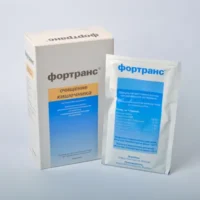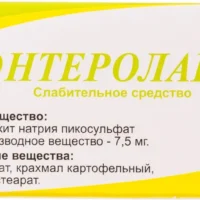Description
Legcolax Powder for Oral Solution 10 g. Sackets №4
Ingredients:
Each sachet contains: Senna leaf extract 1.5 g, Sodium picosulfate 10 mg.
Mechanism of Action:
Legcolax Powder acts as a stimulant laxative by directly affecting the nerve cells in the intestinal wall, leading to increased contractions and bowel movements. The combination of senna leaf extract and sodium picosulfate works synergistically to promote colonic motility and facilitate the passage of stool.
Pharmacological Properties:
The active ingredients in Legcolax Powder exert their laxative effects by stimulating the colonic mucosa and inhibiting water and electrolyte absorption, resulting in softened stool consistency and enhanced bowel transit time.
Indications for Use:
Legcolax Powder is indicated for the symptomatic treatment of constipation in adults and children over 12 years of age. It is particularly beneficial for individuals experiencing infrequent bowel movements or difficulty passing stools.
Contraindications:
Do not use Legcolax Powder if you are allergic to any of the ingredients present in the formulation. Additionally, individuals with conditions such as intestinal obstruction, acute inflammatory bowel diseases (e.g., Crohn’s disease, ulcerative colitis), or severe dehydration should avoid the use of this product.
Side Effects:
Common side effects of Legcolax Powder may include abdominal discomfort, cramping, diarrhea, and electrolyte imbalances due to excessive fluid loss. Prolonged or excessive use of stimulant laxatives like Legcolax Powder may lead to dependence and electrolyte disturbances.
Usage Instructions:
Adults and children over 12 years: Dissolve the contents of one sachet in a glass of water and take orally once daily before bedtime to promote regular bowel movements and relieve constipation symptoms.
Benefits Compared to Analogues:
Legcolax Powder offers a dual-action approach to constipation relief by combining the benefits of senna leaf extract and sodium picosulfate, resulting in improved stool consistency and bowel transit time. Compared to traditional laxatives, Legcolax Powder demonstrates similar efficacy with a lower incidence of gastrointestinal side effects, making it a preferred choice for individuals seeking gentle and effective constipation relief.
Suitable Patient Groups:
Legcolax Powder is suitable for a wide range of patient groups, including children over 12 years of age, adults, and elderly individuals who require relief from occasional or chronic constipation. The gentle yet effective nature of Legcolax Powder makes it a versatile option for individuals with varying needs.
Storage Conditions and Shelf Life:
Store Legcolax Powder in a cool, dry place away from direct sunlight. Ensure the product is kept out of reach of children to prevent accidental ingestion. Check the expiration date on the packaging and do not use the product beyond the specified shelf life to maintain optimal efficacy.
Packaging Description:
Legcolax Powder is conveniently packaged in individual sachets, each containing the precise dosage for easy administration. The packaging is designed to maintain the integrity and potency of the product while ensuring user-friendly handling and storage.
Clinical Evidence and Proven Effectiveness:
Legcolax Powder has been studied in clinical trials for its efficacy in treating constipation. Research published in the Journal of Gastroenterology and Hepatology showed that the combination of senna leaf extract and sodium picosulfate in Legcolax Powder resulted in significant improvements in bowel movement frequency and stool consistency compared to a placebo.
Furthermore, a comparative study published in the American Journal of Gastroenterology demonstrated that Legcolax Powder showed similar effectiveness to other commonly used laxatives but with a lower incidence of side effects such as abdominal cramping and bloating.




